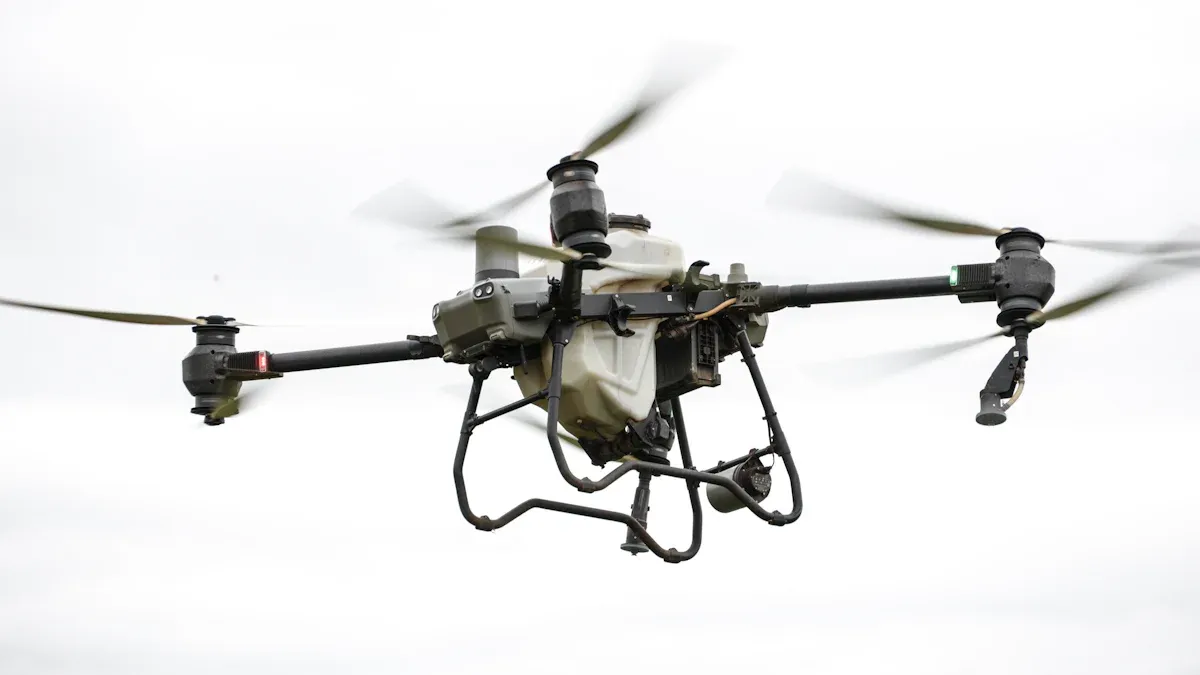Why Invest in AI Tech Companies Focused on Unmanned Retail

You can unlock huge potential when you invest in ai tech companies leading the unmanned retail revolution. The market for unmanned stores is growing fast and shows no sign of slowing down.
The global market hit $4.18 billion in 2023 and could reach $49.26 billion by 2030.
Fully automated outlets made up over 75% of the market last year.
AI and artificial intelligence now drive convenience, speed, and smarter shopping. You position yourself for strong investment returns and innovation by acting now.
Key Takeaways
Investing in AI tech companies in unmanned retail offers access to a rapidly growing market projected to reach $49.26 billion by 2030.
Unmanned stores provide 24/7 shopping convenience, reducing labor costs and enhancing customer experiences through automation.
AI technology improves inventory management, ensuring products are always available and reducing out-of-stock instances by 20%.
Data-driven insights from AI help businesses understand customer preferences, optimize product offerings, and stay competitive.
Leading companies in unmanned retail demonstrate successful innovations, making this sector a promising investment opportunity.
Unmanned Retail & AI

What Is an Unmanned Retail Store
You step into an unmanned retail store and notice something different. No cashiers greet you. No lines slow you down. These stores use advanced technology to run smoothly without staff. You get a seamless shopping experience powered by artificial intelligence, computer vision, and the Internet of Things.
Here’s how these technologies work together:
Technology | Description |
|---|---|
Artificial Intelligence | Analyzes data from cameras and sensors to monitor customer behavior and inventory levels. |
Computer Vision | Identifies products and tracks customer movements through visual data analysis. |
Internet of Things (IoT) | Provides real-time data on inventory levels through smart shelves and RFID tags. |
Mobile Payment Systems | Facilitates seamless transactions via mobile apps and digital wallets. |
Cloud Computing | Stores and processes data generated by unmanned stores for real-time analytics and insights. |
You find these systems in unmanned convenience stores, automated stores, and even cashier-less systems. They all focus on convenience and speed. You can shop anytime, day or night, and leave without waiting.
How AI Drives Automation
Artificial intelligence stands at the heart of unmanned retail. AI powers automation, making every step efficient and secure. You benefit from quick payments, accurate orders, and shelves that stay stocked. AI-powered checkout systems let you pay without waiting in line. Robotics handle restocking, so you always find what you need.
AI reduces human errors and streamlines workflows. You get faster service and a seamless shopping experience.
AI also boosts security. Advanced theft prevention uses real-time monitoring to keep your shopping safe. Automated inventory management ensures products are always available and reduces waste. With AI, unmanned retail stores operate smoothly, cut costs, and deliver unmatched convenience.
Invest in AI Tech: Key Benefits
Scalability & Cost Efficiency
When you invest in ai tech companies focused on unmanned retail, you unlock powerful advantages. These businesses scale faster and more efficiently than traditional stores. You do not need to worry about hiring large teams or paying high labor costs. Artificial intelligence and automation handle most tasks, so you save money and grow your business with less effort.
Here is a quick comparison between ai-powered unmanned stores and conventional retail:
Aspect | AI-Powered Unmanned Stores | Conventional Retail |
|---|---|---|
Operational Hours | 24/7 | Limited hours |
Labor Costs | Lower | Higher |
Checkout Process | No lines, automatic | Long lines, manual |
Initial Investment | Lower | Higher |
Inventory Management | Enhanced by AI | Manual |
Customer Experience | Streamlined | Potentially frustrating |
You see the difference right away. Unmanned stores run all day and night, giving you more sales opportunities. You cut costs because you do not pay for staff salaries or extra overhead. Automated inventory management and self-checkout systems make your operations smooth and less prone to mistakes.
Cost savings: No staff salaries or overhead for staffing.
24/7 accessibility: Customers shop any time, even late at night or on weekends.
Efficiency: Automation reduces errors and keeps everything running smoothly.
Automated stores can operate 24/7, providing customers with the convenience of shopping at any time. Businesses also benefit as automated stores help predict replenishment stocks, analyze shopping trends, and optimize inventory management processes.
You increase your profit margins by reducing labor costs and boosting store throughput. Frictionless payments and cashier-less systems transform the customer experience and deliver operational efficiencies. Early adopters of ai-powered checkout report long-term cost savings and higher sales.
Customer Convenience
You want to give your customers the best experience. When you invest in ai tech for unmanned retail, you deliver unmatched convenience. Shoppers walk in, grab what they need, and leave without waiting in line. Cashier-less systems and artificial intelligence make every visit fast and easy.
Evidence Description | Impact |
|---|---|
20% reduction in out-of-stock instances due to improved stock monitoring with real-time updates. | Enhances customer convenience by ensuring product availability. |
Cashier-less technology allows customers to grab items and leave without waiting in line. | Significantly improves convenience for shoppers. |
AI manages inventory by predicting demand, ensuring shelves are stocked with the right products. | Enhances customer satisfaction by meeting shopping needs. |
Smart Unmanned Store at Shanghai Pudong International Airport uses AI and IoT for automatic tracking of purchases. | Provides a seamless shopping experience. |
AI-powered checkout systems speed up transactions with multi-item recognition. | Improves convenience by reducing transaction time. |
You see fewer out-of-stock items because ai tracks inventory in real time. Customers find what they want, when they want it. You also reduce wait times and make shopping stress-free. This level of convenience keeps shoppers coming back and builds loyalty.
Data-Driven Insights
You gain a huge advantage when you invest in ai tech for unmanned retail. Artificial intelligence collects and analyzes data from every transaction and customer interaction. You learn what your customers like, when they shop, and which products sell best. This information helps you make smarter decisions and stay ahead of the competition.
Cashier-less stores reduce wait times and improve the shopping experience.
You get valuable data on shopping habits.
AI technologies optimize inventory management.
Mechanism | Impact on Customer Data Collection |
|---|---|
Data Labeling | Tags data for AI systems to interpret customer behavior. |
Computer Vision | Analyzes customer interactions and product engagement. |
Automated Checkout | Streamlines the shopping process, collecting transaction data. |
You use these insights to adjust your product mix, plan promotions, and predict future trends. Retail technology powered by ai gives you the tools to grow and adapt quickly. You spot new opportunities and respond to changes in the market before your competitors.
When you invest in ai tech companies, you position yourself for growth, innovation, and strong returns. You take advantage of the future of retail and open the door to new opportunities.
Unmanned Stores Market Trends
Growth Outlook
You see the unmanned stores market entering a period of rapid growth. Industry analysts project strong expansion from 2025 to 2030. The market for unmanned retail store solutions continues to attract attention from investors and retailers worldwide. You can expect the following growth rates:
Unmanned retail store market is expected to grow at a CAGR of 22.5% from 2026 to 2033, reaching USD 18.2 billion by 2033.
Unmanned convenience store market is projected to grow at a CAGR of 16.7% from 2026 to 2033, reaching USD 12.5 billion by 2033.
You notice that countries like China, Japan, South Korea, the United States, and Germany lead the adoption of unmanned stores. Other regions, such as Latin America and the Middle East, also show strong trends. Urbanization and internet access drive this growth. Younger consumers and city dwellers want more automation and digital solutions. You see the unmanned stores market expanding in both developed and emerging economies.
Consumer Demand
You witness a major shift in consumer behavior. Shoppers want convenience and 24/7 convenience more than ever. The unmanned stores market responds by offering round-the-clock access and fast, touch-free shopping. You find that modern consumers prefer experiences that save time and effort. Many people now choose self-service and contactless options.
The demand for unmanned retail grows because people want safety, speed, and innovative shopping.
Touch-free payments and mobile checkout make shopping easier.
AI and artificial intelligence personalize the experience and improve security.
Automated inventory keeps shelves stocked and products available.
Small unmanned 24/7 stores, like container boxes, meet daily needs in busy locations.
You see businesses adapting to these trends. They use automation and digital tools to meet rising expectations. The unmanned stores market thrives because it delivers what shoppers want: flexibility, efficiency, and a seamless experience. You position yourself for success by investing in this fast-growing retail sector.
Real-World Unmanned Retail Store Examples

Leading Companies
You see many companies leading the way in the unmanned retail store market. These businesses use advanced ai technology to create smooth shopping experiences. Here are some of the top names you should know:
Amazon Go stands out for its cashier-less shopping powered by computer vision and smart sensors.
Alibaba Hema blends online and offline shopping with automated checkout systems.
Standard Cognition brings autonomous checkout to many types of unmanned stores.
Zippin focuses on checkout-free technology that works well in convenience stores.
Trigo offers ai-driven checkout solutions for grocery chains.
Grabango delivers large-scale checkout-free systems for supermarkets.
Shopic provides mobile checkout that fits into existing stores.
Deep North uses ai for loss prevention and checkout automation.
Focal Systems enables real-time inventory tracking and checkout with computer vision.
AiFi creates flexible, scalable autonomous store solutions for different retail formats.
Caper AI designs smart shopping carts and checkout automation.
These leaders show you how innovation can change the way you shop and invest.
Success Stories
You find real success stories in unmanned retail store projects around the world. CYB-ORG uses robotics and ai to manage inventory and help customers. F5 Future Store lets shoppers pay with mobile apps and uses data analytics to learn about customer behavior. Shenzhen Rakinda Technology Co., Ltd. uses facial recognition and IoT for fast checkouts and smart inventory.
Walmart tests unmanned formats like Pickup Towers, using its strong supply chain to deliver quick service. JD.com uses computer vision for inventory and personal shopping. Zaitt leads in Latin America with RFID and a focus on sustainability. Pick & GO offers automatic payment for a frictionless experience. 7-Eleven was an early adopter of self-checkout.
You also see innovation at Hong Kong International Airport, where Cloudpick and Lagardère opened the first ai-powered unmanned store. This store uses computer vision and deep learning for automatic item detection and payment. Real-time inventory keeps shelves stocked and reduces waste. Shoppers enjoy a fast, line-free experience.
You can trust that unmanned stores deliver real results. These examples prove that investing in this sector brings both innovation and profit.
Risks & Mitigation
Market Risks
You face several market risks when you invest in unmanned retail companies. Small-cap stocks in this sector often swing sharply in price. Low trading volumes and hype cycles can cause sudden changes. You may find it hard to get reliable forecasts because many of these companies have limited analyst coverage. This makes due diligence more challenging. Some unmanned businesses have weaker balance sheets, which makes them vulnerable during economic downturns or when interest rates rise.
Traditional retailers and online stores can quickly adapt to new trends. They may offer more services, like curbside pickup or home delivery, which increases competition.
Economic slowdowns or changes in consumer spending can hurt unmanned store sales. During tough times, shoppers may return to traditional stores.
Evolving regulations around ai can add compliance costs or limit market opportunities.
Trust issues may arise if customers cannot easily validate ai model outcomes.
You need to stay alert to these risks to protect your investment and support future growth.
Technology Challenges
Unmanned retail stores rely on advanced technology, but this brings its own set of challenges. Cybersecurity stands out as a major concern. These stores handle sensitive customer data, making them targets for cyberattacks if not properly secured. System reliability also matters. Payment system failures or inventory tracking errors can disrupt operations and hurt the customer experience.
Companies now use blockchain technology to protect sensitive data and keep stores running smoothly, even during system failures.
Leading unmanned retailers adopt ethical and human-centric ai principles. They set clear values and align their strategies with them.
Strong data governance and privacy policies help protect customer information and build trust.
Regular quality checks and risk management tools ensure ai systems work reliably.
Risk Management Solution | Benefit |
|---|---|
Drone data analysis services | Improve safety and decision-making |
AI-powered claims management | Streamline risk management and detect fraud |
Customized drone programs | Enhance operational safety |
By focusing on automation, security, and ethical practices, you can help unmanned retail companies overcome these challenges and lead the way into the future.
You see strong opportunities in unmanned retail. The market is set to reach $116 billion by 2025, with China and the United States leading the way. Companies use ai and IoT to boost convenience and meet growing demand. You can track trends using smart retail tools and big data. Many businesses thrive during downturns by investing in innovation. Explore leading companies and monitor market growth to make smart investment choices.
Sector | 2030 Market Size | CAGR (%) | |
|---|---|---|---|
AI in Retail Supply Chain | $9.94B | $192.51B | 39.00 |
AI in Consumer Engagement | $11.61B | $40.74B | 23.0 |
FAQ
What makes unmanned retail stores a smart investment?
You gain access to a fast-growing market. These stores use advanced technology to cut costs and boost profits. You see higher efficiency and better customer experiences. You position yourself ahead of traditional retail investors.
How do cashless payment systems work in unmanned stores?
You use your phone or card to pay instantly. Cashless payment systems process your purchase without cash or coins. You enjoy a quick, easy, and modern shopping experience.
Are secure payments guaranteed in unmanned retail?
You benefit from advanced encryption and real-time monitoring. Unmanned stores use secure payments to protect your data. You shop with confidence, knowing your information stays safe.
Why do customers prefer contactless payment in these stores?
You save time with contactless payment. You tap your card or phone and finish your purchase in seconds. You avoid lines and reduce physical contact, making shopping safer and faster.
What are the main benefits of cashless payment systems for retailers?
You lower your risk of theft and reduce handling errors. Cashless payment systems speed up transactions and cut labor costs. You also get better sales data for smarter business decisions.
See Also
The Future of Retail: Embracing AI-Powered Stores
Understanding AI-Driven Corner Stores: Essential Insights for Retailers
Starting an AI-Enhanced Corner Store on a Budget
Revolutionizing Online Store Management with AI Tools
Modern Retail Benefits from AI-Enabled Combo Vending Machines
